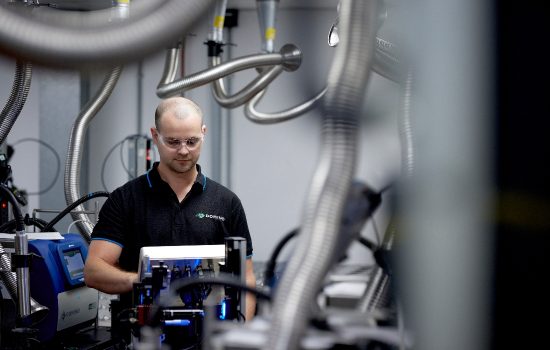The Institute for Manufacturing, University of Cambridge (IfM), spotlight the inspiring initiatives led by Women in Manufacturing UK and their dedication to increasing women’s representation in the industry. This article also examines the critical importance of inclusive leadership and how it can pave the way for a more diverse and vibrant manufacturing landscape.
The manufacturing industry is undergoing a profound transformation fuelled by digitalisation, a pressing shortage of skilled workers and a determined shift towards achieving a net zero economy. While these changes present unique challenges, they also bring significant opportunities for growth and innovation. One of the most promising avenues is to address gender disparities and foster inclusive leadership within the sector.
The Women in Manufacturing UK (WiM UK) initiative, launched in 2022, was established by the Institute for Manufacturing (IfM), the High Value Manufacturing Catapult and Innovate UK, all united by a shared commitment to enhancing diversity and inclusion in the manufacturing sector. With the ambitious goal of increasing women’s participation in manufacturing to 35% by 2035, WiM UK aims to unlock the potential of over 200,000 women, tackling labour shortages while driving growth in the industry.
“While progress has been made in fostering more inclusive workplaces, women remain significantly underrepresented. Their perspectives, creativity and skills are key to shaping the industry’s future. Building a culture that values gender diversity, fuels innovation, strengthens resilience and accelerates growth. To unlock the sector’s full potential, a steadfast commitment to inclusion is essential”, said WiM UK Senior Adviser Jennifer Castañeda-Navarrete of the IfM. “As the manufacturing industry evolves, diversity and inclusion must be seen not only as ethical responsibilities, but as essential drivers of business success and societal progress.”
Case Study: Creating a culture of inclusion
CPI, a technology innovation catalyst in the UK, promotes inclusive leadership by integrating a senior leadership sponsor for equality, diversity and inclusion (EDI). Founded in 2004, it employs over 650 people across England and Scotland, focusing on AgriFoodTech, Materials, Energy Storage, HealthTech and Pharma. CPI’s EDI journey advanced in February 2022 when CEO Frank Millar signed the Catapult Network’s Inclusivity in Innovation Charter, committing to diverse and inclusive workplaces. The charter emphasises actions such as:
- Developing a strategy and roadmap
- Collecting and reporting data
- Setting monitoring targets
- Establishing senior executive accountability
- Assistance for Neurodiversity, and Caregivers, Hidden and Chronic Illnesses, Ongoing Mental Health Support and Requirements for accessibility (ANCHOR)
- LGBTQ+ (PRISM)
- Race, religion, culture and ethnicity (EmbRACE)
- Women in CPI (WICPI)
These groups enhance engagement by allowing employees to connect with causes they resonate with. They measure progress using qualitative and quantitative data, including gender pay gap statistics and group-specific initiatives.
The WICPI group provides a support network for women and promotes awareness among men regarding gender challenges, featuring three subgroups:
- Pregnancy and maternity, focusing on support and policies.
- Career development, offering mentorship and networking opportunities.
- Women’s health and wellbeing, addressing topics like menopause and domestic abuse.
Collaborating with inclusive employers, the group received a silver accreditation in 2023. Moving forward, it aims to expand these groups to further drive its inclusive culture.
The state of women in manufacturing
Despite efforts to improve gender diversity, women remain underrepresented in manufacturing, comprising only 26.1% of the workforce. Progress has been slow, with only a slight increase from 25.9% in 2022. This ongoing challenge underlines the importance of understanding the current landscape for women in the industry.
With this in mind, the WiM UK annual report highlights the progress and challenges faced by women in UK manufacturing over the past year. The 2024 edition aims to review gender disparities in women’s participation in manufacturing, provide actionable insights for both industry and government, and establish a proposed framework for fostering an inclusive manufacturing environment.
The report begins with an annual review of progress and setbacks, which inform the themes of addressing labour shortages, employee retention and driving equality, diversity and inclusion.
The report’s key findings:
- Little progress has been made in women’s representation from 2022 to 2023
- Progress by occupation is mixed, with small gains in managerial and office roles and a significant decline in women’s representation in professional occupations
- Rising part-time roles highlight a persistent gender divide in unpaid work
- The gender pay gap has narrowed from 16.7% to 15.9% between men and women 37
- The UK lags behind other leading manufacturing countries in women’s participation, ranking last in the top 15
The report provides principles for companies and industry associations and recommendations for a gender-responsive Industrial Strategy to help create equal opportunities and a diverse workforce.
The principles cover all aspects of business, from championing equality, diversity and inclusion in leadership to ensuring a diverse talent pool and inclusive recruitment. A set of key steps ensures that diversity and inclusion remain an integral part of business operations.
“As organisations adopt these principles, the focus on inclusive leadership becomes particularly relevant. This emphasis not only supports the overarching objectives of equality and diversity but also highlights the tangible benefits of prioritising gender diversity”, highlighted Jennifer.
The business case for inclusive leadership
Inclusive leadership is a cornerstone of WiM UK, as businesses that prioritise gender diversity not only outperform their competitors in innovation, decision-making and financial performance, but also contribute significantly to economic growth.
For instance, a 2024 Make UK report estimated that filling manufacturing vacancies could boost the UK’s GDP by £7bn annually, emphasising the vital role of inclusive practices in driving both company success and national prosperity.
Despite the proven benefits, many organisations struggle to implement effective equality, diversity and inclusion (EDI) strategies. “The business case for inclusive leadership is clear”, continued Jennifer. “Companies that invest in fostering an equitable workplace not only enhance employee engagement but also improve retention and productivity. However, to achieve lasting change, inclusion must be embedded in business strategies rather than treated as a checkbox exercise.”
To support organisations in cultivating an inclusive culture, WiM UK has identified key actions that drive measurable progress:
Dedicated leadership: Assigning senior leaders to oversee EDI initiatives ensures company-wide accountability. Inclusive leadership starts at the top – when executives champion diversity, it signals to employees that inclusion is a business priority.
Unconscious bias training: Unconscious biases influence hiring decisions, performance evaluations and workplace interactions. Providing managers with training to recognise and mitigate biases is essential for fostering an inclusive workplace.
Gender equality integration: Embedding EDI into business values, strategic plans and culture promotes sustainable change. Businesses that align EDI goals with their overall strategy and integrate diversity into decision-making processes see more sustainable outcomes. This includes setting measurable targets for gender representation at all levels and ensuring diversity in leadership roles.
Clear EDI strategies: Setting measurable targets and implementing roadmaps for diversity and inclusion initiatives drives progress.
Resource allocation: Financial and human resources must be dedicated to EDI efforts to ensure long-term impact.
Industry-wide collaboration: Participating in diversity charters and networks amplifies collective efforts toward gender equality. For inclusive leadership to create lasting impact, businesses must move beyond performative measures and commit to systemic change.
By embedding these principles into their business models, manufacturing organisations can unlock greater innovation, enhance employee satisfaction and secure a competitive edge.
“As the manufacturing industry evolves, companies that prioritise inclusivity will not only meet workforce demands but also shape a more resilient, forward-thinking sector. Now is the time to invest in leadership that champions diversity – not just as an ethical imperative, but as a strategic advantage,” added report Co author Dr Viktória Döme, IfM.
For more articles like this, visit our People & Skills channel.



